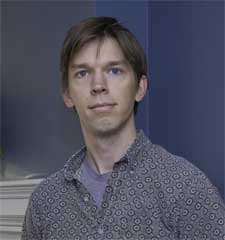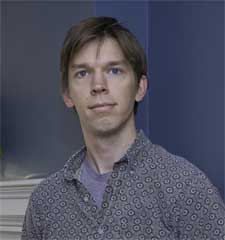 North Scituate native graduates May 18, then on to grad school
North Scituate native graduates May 18, then on to grad school
KINGSTON, R.I. – May 6, 2008 – Like many students, North Scituate native Carl Smith wasn’t entirely certain of his career path after high school. He took some time off, enrolled at the University of Rhode Island as a philosophy major, and strongly considered becoming a medical doctor before changing his major to applied mathematics.
In the end, it was a fortuitous decision. As he prepares to graduate from URI on May 18, he is looking forward to entering Columbia University for graduate school after having been awarded a $121,500 graduate fellowship from the National Science Foundation.
“Applying for the NSF Graduate Research Fellowship was an exhausting, time-consuming process – almost 40 hours a week for a month – developing essays, formulating a research project, and putting together a coherent and impressive personal statement,” said Smith, who received several academic honors during his URI years. “But I got it, so it turns out to have been time well spent at a great hourly rate. Not only will it pay for tuition, but it gives me a travel budget to go to conferences and pays for time to use a national supercomputer.”
Smith believes that the roundabout route he took to choosing a major was a worthwhile process that ultimately pointed him down the right path.
“Being a physician seemed like something that was intrinsically worthwhile, but in shadowing doctors and at the same time taking coursework in the physical sciences, I decided that I was better suited to the lifestyle of a scientist,” he said.
Smith took advantage of numerous scientific research opportunities at URI. He worked in a molecular biology lab sequencing the genome of a fish pathogen, and he later served as an intern in an electrochemistry lab conducting battery research.
“My role was making prototype batteries, measuring their various electrical properties, and trying to figure out how the different physical components of the battery gave rise to the electrical properties, like resistance and impedance,” he explained.
“The battery project is chemical research but involves mathematics. The interpretation of the electrochemical data involves linear circuit theory and quantities modeled by numbers in the complex plane.”
As a URI senior he gained additional research experience working in a chemistry lab conducting computational research.
“We are coding and enacting computational simulations of certain physical systems in order to calculate their thermodynamic properties like energy and heat capacity,” he explained. “I’ve most recently studied a Leonard Jones cluster, a physical system consisting of identical particles having a fairly simple potential energy function with respect to their distance from one another. You set up a bunch of those particles together in a virtual space and, given some rules (the computer program) on how they move under the influences of temperature and the potential energy function, you see what happens.”
All of Smith’s URI research prepared him well for his upcoming graduate research in theoretical chemistry at Columbia. Ultimately, he hopes for a career as a college professor applying his training to problems in the neurosciences.
“I started out pursuing an interest in philosophy, specifically in problems of mind,” Smith said. “To whatever extent they can be treated scientifically, I want to work on problems of neuroscience and mind, questions of thinking and meaning, maybe even consciousness, but we’re probably not really ‘there’ yet.”
URI Department of Communications & Marketing photo by Michael Salerno Photography

